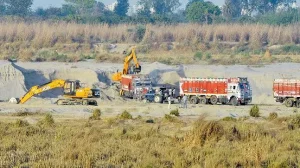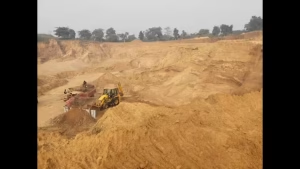New Delhi – In a significant development addressing environmental concerns along the Yamuna river, Delhi CM Writes to Yogi Against Sand Mining activities that are threatening the ecological balance of the region. Chief Minister Rekha Gupta has formally written to her Uttar Pradesh counterpart Yogi Adityanath, highlighting the urgent need for coordinated action against illegal sand mining operations on the Yamuna floodplains at the Delhi-UP border.
The communication where Delhi CM Writes to Yogi Against Sand Mining emphasizes the critical environmental and safety concerns arising from these unauthorized activities. The illegal mining operations are reportedly weakening river embankments and significantly increasing the risk of flooding, posing serious threats to communities living along the riverbanks.
Jurisdictional Challenges and Boundary Issues
The letter in which Delhi CM Writes to Yogi Against Sand Mining addresses a fundamental issue that has complicated enforcement efforts. The lack of clearly defined jurisdictional boundaries between Delhi and Uttar Pradesh in certain riverfront areas has created confusion in enforcement mechanisms, allowing illegal mining activities to continue unchecked.
Chief Minister Gupta’s initiative where Delhi CM Writes to Yogi Against Sand Mining specifically requests the UP CM to instruct his officials to initiate a joint interstate demarcation process. This proposed collaboration would clearly define jurisdictional boundaries, enabling synchronized administrative efforts by both states to protect the region’s ecological balance.
The interstate coordination aspect highlighted when Delhi CM Writes to Yogi Against Sand Mining represents a crucial step toward addressing the enforcement gaps that have allowed these illegal activities to flourish. The proposed joint demarcation process would eliminate the administrative confusion that has hindered effective action against unauthorized mining operations.
Environmental Impact and Ecological Concerns

The detailed information shared when Delhi CM Writes to Yogi Against Sand Mining reveals the extensive environmental damage caused by these illegal operations. The sand mining activities are manipulating the riverbed and altering the Yamuna’s natural flow patterns, leading to what officials describe as irreparable ecological damage.
The environmental disruption detailed in the communication where Delhi CM Writes to Yogi Against Sand Mining directly impacts populations living along the Yamuna banks. These communities face increased risks due to the weakened river embankments and altered flood patterns resulting from the unauthorized mining activities.
The ecological concerns raised when Delhi CM Writes to Yogi Against Sand Mining extend beyond immediate environmental damage. The alterations to the river’s natural flow and bed structure could have long-lasting impacts on the region’s biodiversity, water quality, and overall ecosystem health.
National Green Tribunal Involvement and Legal Framework


The letter where Delhi CM Writes to Yogi Against Sand Mining references the ongoing involvement of the National Green Tribunal (NGT) in addressing these illegal activities. The NGT has been actively engaged in cases related to unauthorized sand mining along the Yamuna river, particularly in Ghaziabad district.
Specifically, the NGT has addressed concerns about illegal sand mining in Khasra numbers 8, 9, 10, 11, 12, 13, 37, and 38 in village Pachagarha Khand 1, Ghaziabad. The tribunal’s actions have included imposing environmental compensation and directing authorities to prevent further illegal mining operations.
The NGT’s consistent concerns, as highlighted when Delhi CM Writes to Yogi Against Sand Mining, underscore the gravity of the situation. The tribunal has repeatedly emphasized that these activities are causing significant environmental harm and must be stopped immediately through coordinated regulatory enforcement.
Regulatory Enforcement and Compliance Issues


The communication where Delhi CM Writes to Yogi Against Sand Mining emphasizes the urgent need for enhanced regulatory enforcement. The current lack of effective oversight has allowed illegal mining operations to continue despite existing environmental regulations and legal frameworks.
Chief Minister Gupta’s letter stresses that the activities grossly violate environmental norms, as mentioned when Delhi CM Writes to Yogi Against Sand Mining. These violations include unauthorized manipulation of riverbed structures and deliberate alteration of natural water flow patterns, both of which are prohibited under environmental protection laws.
Also Read: Government Appoints 1.4k Healthcare Workers: Massive Recruitment Drive To Transform Delhi
The enforcement challenges addressed when Delhi CM Writes to Yogi Against Sand Mining highlight the need for interstate coordination to ensure comprehensive regulatory oversight. The proposed joint approach would eliminate enforcement gaps that have allowed illegal operators to exploit jurisdictional ambiguities.
Flood Risk and Public Safety Concerns

The safety implications detailed when Delhi CM Writes to Yogi Against Sand Mining are particularly concerning given the monsoon season’s approach. The weakened river embankments resulting from illegal mining activities have significantly increased flood risks for communities along the Yamuna.
The flood danger emphasized in the letter where Delhi CM Writes to Yogi Against Sand Mining poses serious risks to both life and property. The altered river flow patterns and compromised embankment integrity could lead to catastrophic flooding during heavy rainfall periods.
The public safety concerns raised when Delhi CM Writes to Yogi Against Sand Mining extend beyond immediate flood risks. The ongoing environmental degradation could have long-term consequences for water security, agricultural productivity, and overall community well-being in the region.
Proposed Solutions and Collaborative Approach
The comprehensive approach outlined when Delhi CM Writes to Yogi Against Sand Mining includes several key recommendations for addressing the crisis. The primary proposal involves establishing a joint interstate demarcation process to clearly define administrative boundaries and responsibilities.
The collaborative framework suggested in the communication where Delhi CM Writes to Yogi Against Sand Mining would enable both states to coordinate their enforcement efforts effectively. This synchronized approach would eliminate the jurisdictional confusion that has hindered previous enforcement attempts.
The interstate coordination mechanism proposed when Delhi CM Writes to Yogi Against Sand Mining represents a model for addressing similar environmental challenges that span state boundaries. The success of this initiative could establish precedents for future interstate environmental cooperation.
Closing Statements
The formal communication where Delhi CM Writes to Yogi Against Sand Mining represents a crucial step toward addressing a serious environmental crisis. The illegal sand mining activities on the Yamuna floodplains pose immediate risks to public safety and long-term threats to ecological stability.
The comprehensive approach outlined in Chief Minister Gupta’s letter emphasizes the need for immediate action to prevent further environmental degradation. The proposed interstate coordination mechanism offers a practical solution to the jurisdictional challenges that have complicated enforcement efforts.
The success of this initiative will depend on the prompt response from the Uttar Pradesh government and the effective implementation of the proposed joint demarcation and enforcement mechanisms. The environmental and safety stakes involved make this collaboration essential for protecting the Yamuna river ecosystem and the communities that depend on it.

